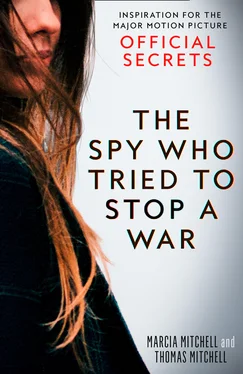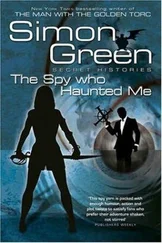‘May I speak to Frank Koza, please.’
‘Who may I say is calling?’
‘Ed Vulliamy of the Observer newspaper in London.’ Pause.
‘Who do you want to speak to?’ the receptionist asked.
‘Frank Koza.’
‘Sorry, I’ve never heard of him.’
The Observer team now believed they were on solid ground. Ed was asked to check around with various insider sources and learned that the style and content of the message seemed consistent with authentic communications of this nature. They decided, after three weeks of investigation, that the memo was not a forgery, that there was no way it ‘could have been set up’.
One final concern was the possibility of legal action against the newspaper.
‘More of a concern to us was that we would be joined in the prosecution,’ Martin explains. ‘To publish is an offence under the Official Secrets Act. We were as culpable as Katharine. But they’re cowards. So, they preferred to take on the little guy – in this case, little woman – rather than us big guys.’
The editorial team had to be careful in speaking to sources about the NSA message. Loose talk could lead to a legal injunction prohibiting publication. Earlier, the newspaper had been successful in fighting an injunction in the case of former MI5 officer David Shayler, also charged with violation of the Official Secrets Act. The court’s decision had been close, but the Observer had prevailed. Bright and company were counting on the government’s not coming after them again. The Shayler case had become so high profile that it now stood as a principle against the police going to journalists for evidence. The Shayler injunction application had asked for all meeting notes and tape recordings concerning the case, a broad ‘trolling’ request eventually denied. Bright notes that a different decision would have meant that every time a journalist wrote about an investigation, an application could be made to ‘turn over everything that might be of interest’ to law enforcement.
Going on the experience with Shayler, trusting their gut feelings about the authenticity of the Koza message, and figuring that the government would not prosecute the Observer for an Official Secrets Act violation, the decision was made to publish three weeks after Bright and Ridley met in Central London.
It was still a risk.
In Washington, last-minute preparations for Powell’s historic and, as it would turn out, inaccurate report to the United Nations must surely have been aided by the information requested by Frank Koza and eagerly scrutinized by the folks behind the operation. It was advantageous to know what the opposition was thinking.
The operation continued beyond Powell’s performance. For four weeks, the surveillance ‘surge’ went according to plan. Despite the continuing problem with Aguilar Zinser and Valdés, there was hope in Washington that the swing voters would soon join the right team (if need be, through coercion), that China would hold to its position of abstaining, and that Russia and France could be convinced to go along. In that case, success was at least within the realm of reasonable possibility. It was, until travel along the secret road to war encountered a dangerous, and unanticipated, barrier.
And in Cheltenham: ‘I went to my local shop, as usual, on a Sunday morning to get my copy of the newspaper. It was 2 March. I was completely, totally bowled over – gobsmacked – when I saw what was on the front page. It knocked me for six, and I think that’s the point where it hit me that I was in trouble. Serious trouble.’
‘The United States is conducting a secret “dirty tricks” campaign against UN Security Council delegations in New York as part of the battle to win votes in favour of war against Iraq,’ Martin Bright, Ed Vulliamy, and Peter Beaumont wrote. ‘Details of the aggressive surveillance operation, which involves interception of the home and office telephones and the e-mails of UN delegates in New York, are revealed in a document leaked to the Observer .
‘The memo describes orders to staff … whose work is clouded in secrecy, to step up its surveillance operations … to provide up-to-the minute intelligence for Bush officials.’
Made clear in both the news story and the memo itself was that UNSC members not specifically named by Frank Koza also were of interest. These would include Russia, France, China, and Mexico. And it would be more than a year later when the full extent of the surveillance was known.
The Observer scoop noted that the disclosure came ‘amid increasingly threatening noises from the United States towards undecided countries of the Security Council who have been warned of the unpleasant economic consequences of standing up to the United States’. Attributed to Washington sources was information that President Bush’s national security adviser, Condoleezza Rice, requested the spy operation. It was predicted, albeit wrongly, that this NSA misadventure would be ‘deeply embarrassing to the Americans’.
The nature and depth of news coverage made it clear that this was not going to be one of the usual ‘reliable government source’ leaks. It was explosive, and there would be demands for accountability. Katharine made her way home in struggling slow motion, manoeuvring through a slog of sickening fear, apprehension, and guilt – guilt only so far as Yasar and her family were concerned. The full realization of what her action could mean to her husband’s safety struck her as solidly as a slap on the face. And there were her beloved parents and brother living and working in Taiwan, not to mention Gran in Yorkshire. All those who loved and trusted her.
It was not known who leaked the message or where that person worked. But the fact that the message had been replicated in the newspaper, not just its contents reported in an article, that it had been headlined on page one, signalled that naming the betrayer would be only a matter of time. Gobsmacked.
Katharine fell into the house and into Yasar’s arms, sobbing, so distraught that he was terrified and had difficulty making sense of what she was trying to say. Katharine handed him the newspaper. ‘It was me,’ she said. Slowly he read the headlines and the beginning of Bright’s story. His reaction was gentle, surprisingly so for a passionate Mediterranean temperament. ‘I understand,’ he told her. ‘You did what you had to do. I am proud of you.’
Yasar tried to comfort his wife, but she could not stop crying. He told her, ‘You don’t have to tell anybody. Nobody knows it’s you if you don’t confess. They can’t prove anything.’
The fear made her physically ill all that Sunday and throughout the night. Vomiting and diarrhoea left her weak, and she was barely able to dress for work in the morning. She thought about calling in sick but then thought better of it, not wanting to call undue attention to herself. This morning, when Yasar dropped her at the gate he held her close longer than usual, smoothed her hair, kissed her gently. ‘I am proud of you,’ he told her again when at last she pulled away from him. ‘Very, very proud.’
The manhunt was immediate, thorough, and tough. There would be no anonymous source; the source would be found and punished. Too much was at stake at the moment, principally the hotly debated US/UK draft resolution designed to legitimize a pre-emptive strike on Iraq and to build a broad-based supporting coalition. Throughout the day, various people were called in for interrogation; wide-eyed and apprehensive, they disappeared and, damp-browed and silent, they returned. The air was thick with fear and suspicion.
Katharine’s turn came on Tuesday. She had slept a little on Monday night, but not for long and certainly not peacefully. Her answer to the principal question was simple, direct, and patently false. ‘I read the message and I deleted it.’ The questioning session was just what she expected. She was well prepared and apparently convincing. Katharine remained outwardly calm during her interview but was mentally awash and weak-kneed when she returned to her desk, unable to focus. Blurred images floated mystically across her computer screen, refusing to settle into place, defying her ability to translate. Somehow, she got through the day. The night would be worse.
Читать дальше












